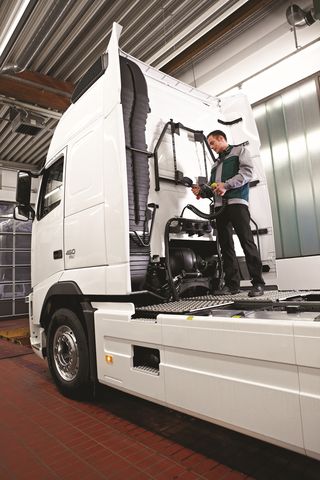Green logistics investigation by DEKRA: Billions in potential savings
Sustainability also pays off from an economic standpoint. That is the result of a current DEKRA investigation regarding green logistics which the expert organisation presented today at the IAA Commercial Vehicles show in Hanover. According to these results, through the use of comparatively simple retrofitting measures and driver training, savings in fuel costs of around 27 per cent can be achieved in the lorry fleet.
In light of continuously increasing diesel prices, the topic is becoming ever more important for the industry: ten years ago, a litre of diesel fuel cost around 84 cents on average over the year. Currently, the average annual price for normal consumers is around €1.48 – an increase of 76 per cent. “As a cost factor, fuel is increasingly taking centre stage. Fuel costs meanwhile account for around 30 per cent of the calculated total costs in a transport company,” says Stefan Kölbl, Chairman of the Management Board of DEKRA e.V. and DEKRA SE. “Economic viability and climate protection are two sides of the same coin: savings in fuel and thus a reduction in CO2 emissions lead to a noticeable reduction in costs at the same time. As a central component of a holistic approach to sustainability, fuel-saving measures really are in the economic interests of companies.”
The specific investments that pay off within a particular time period were investigated by the experts of DEKRA Consulting by means of an up-to-date model calculation. “With manageable investments in the areas of vehicle technology, telematics and driver training, fuel savings of up to 27 per cent can be achieved,” said Dr Gesa Köberle, Head of DEKRA Consulting GmbH summarising the results of the investigation.
With a Euro 5 tractor trailer, for example, it is possible to achieve a reduction in fuel consumption of around 14 per cent simply through improvements in the aerodynamics of the tractor unit and the trailer and the use of premium tyres with low rolling resistance. A modern telematics system, with which the dispatcher can optimise routes and reduce the number of empty runs, yields an additional 5 per cent. A tyre fill pressure monitoring system achieves savings of 3 per cent. Transport companies can attain additional savings of 5 per cent by training their drivers to drive economically.
“For a typical annual mileage of around 140,000 kilometres, the measures described equate to cost savings of nearly €15,000 per vehicle along with CO2 savings of more than 36 tonnes per year,” according to Dr Köberle. “For this, investments of slightly more than €15,000 are required.” With respect to a medium-sized lorry fleet with 30 vehicles, this amounts to savings of 1,100 tonnes of CO2 and €450,000 per year for an investment of €275,000.
“If these figures were applied to the total number of vehicles in Germany, this would result in cost savings in the billions,” says Dr Gesa Köberle. As of the beginning of 2012, the Federal Motor Transport Authority counted around 184,000 tractor units alone.
The DEKRA experts also investigated the payback periods of the individual retrofitting and training measures. Driver training pays off the fastest: after just over a month, the costs of the training are already offset by the savings in fuel consumption. The tyre pressure monitoring system pays for itself after approximately six months. More involved measures such as the telematics system require a bit more time, but even they pay for themselves within 30 months, with respect to a single vehicle. For a fleet of 30 lorries, however, this system already pays for itself after 2 months, since the greatest expenses arise from the one-time system purchase and not from the costs per vehicle.
Possible state grants such as from the de minimis programme have not yet been taken into account here. “If a company applies for and is granted subsidies for its savings endeavours, the payback periods are correspondingly further reduced,” says the Head of DEKRA Consulting GmbH. Individual measures such as training to drive economically then pay for themselves from the first kilometre driven.
In the area of green logistics, DEKRA is pursuing a holistic approach and offers comprehensive solutions to the transport industry from a single source. For example, DEKRA Consulting supports its customers by drawing up CO2 balances not just for the fleet but for the entire transport company. Besides measures to improve the vehicles and route management, warehouses and other buildings are also inspected with regard to their energy efficiency, for example.
In the course of fleet management, especially for the approximately 25,000 members, the DEKRA experts provide consultation for pending investment decisions. In this way, they provide useful decision guidance for the continued use of existing lorries or the changeover to Euro 6 vehicles.
As one of the largest providers of further education in the transport area, the DEKRA Academy has already trained nearly 40,000 drivers in driving economically. For member companies and customers, the savings effect is clearly noticeable, as the feedback shows.
The basis for the DEKRA calculation of fuel savings is the research data from various studies, confirmed by experience gathered by DEKRA experts from consulting services with their customers.
News Categories
- » NEWS HOME
- » Automation & Robotics
- » Industry 4.0
- » Material Handling
- » Sensors
- » Quality & Testing
- » Machine Vision
- » Laser & Optics
- » Metalworking
- » Motion Control & Drives
- » Hydraulics & Pneumatics
- » Process Industry
- » Renewable Energy
- » Agriculture
- » Home & Office Furniture
- » Environmental Tech



